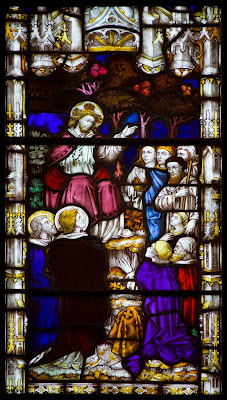Today’s passage from chapter eight of Matthew’s Gospel follows on after the famous Sermon on the Mount which runs through Matthew 5-7. In that long sermon, Jesus is presented as a new lawgiver, a new Moses. A good example of this juxtaposing of Jesus and Moses are the six antitheses in chapter five which have the same recurring structure ‘you have heard that it was said…..but I say to you’. In this way Jesus deepens, extends, brings to fruition the law of Moses but, importantly, he does not revoke this law.
This means that just as the old law given by Moses on Mount Sinai forged Israel into a nation, so the New Law re-founds or extends Israel, extends the people of God to include not only Jews but also Gentiles. After inaugurating this new Law of the Holy Spirit in words in chapters five through seven, Jesus puts these words into practice in chapter eight. As soon as Jesus comes down from the mountain after finishing his long sermon a leper comes and kneels before Him and says: ‘Lord, if you will you can make me clean’ (Matt. 8: 2).
Jesus heals the leper, of course, and sends him to make the offering commanded by Moses as proof to the people (8:4). St. John Chrysostom sees in this healing of the leper a sign of the healing of Israel, the purification of the Jews: Jesus came first of all to save the children of Israel.
Today’s Gospel follows on immediately after this miracle. Jesus arrives at Capernaum, and is confronted by a centurion, a typically Gentile figure, who is also looking for healing. So after inaugurating the New Law in words on the mountain, Jesus begins to put this New Law into action straight away by first ministering to the Jews, and then afterwards reaching out to the Gentiles.
I think it is important to note that in both cases this ministering takes the form of healing: in his treatise on grace, St. Thomas Aquinas uses the analogy of sickness to describe the human condition after sin. We are spiritually sick, and like someone who is bedridden we can move a bit but not very much. We are like the centurion’s servant, lying at home, paralyzed. Now, continuing this analogy, Aquinas thinks that one of the ways we can think about grace is as a kind of spiritual medicine that heals us, restores us to strength, gives us new life. This spiritual medicine is delivered to spiritually sick human beings through the sacraments, through efficacious corporeal signs. Aquinas thinks that this is particularly appropriate given that the root cause of our spiritual sickness is usually an unhealthy or disproportionate attachment to, or dependence on, material things. We meet Christ where we have been wounded.
For me, this sense that Christ applies his spiritual medicine right at the heart, right at the source, right at the roots of our sin in the sacraments makes our repetition of the Centurion’s words in the communion rite of mass so appropriate: ‘Lord, I am not worthy to have you under my roof, but only say the word and my servant [or my soul], shall be healed’ (Matt. 8: 8).
The healing of the New Law that is offered to the whole of humanity is offered in and through Christ’s Body, in and through Christ’s humanity. Jesus offers himself, his Body and Blood, for our healing. This is a gift that we cannot earn, a gift we can never be worthy of, yet it is a gift we can resist; counterintuitively, an over-anxiety to appear perfect to ourselves, or to others or to Christ can be a way of resisting that gift.
In Mark’s Gospel Jesus declares that those who are well do not need a doctor, only the sick (Mark 2:18). The danger with the kind of self-sufficiency that tries to hide all our weaknesses and refuses assistance from others is that is can slide into a refusal to accept Christ's help. So at the beginning of Advent, let us resolve to use this season of preparation as an opportunity to go deeper in our embrace of God's gifts, to allow God to help us, to allow Him to work a deeper healing in our lives, and let us use this time to say thank you for what we have already received.


No comments:
Post a Comment